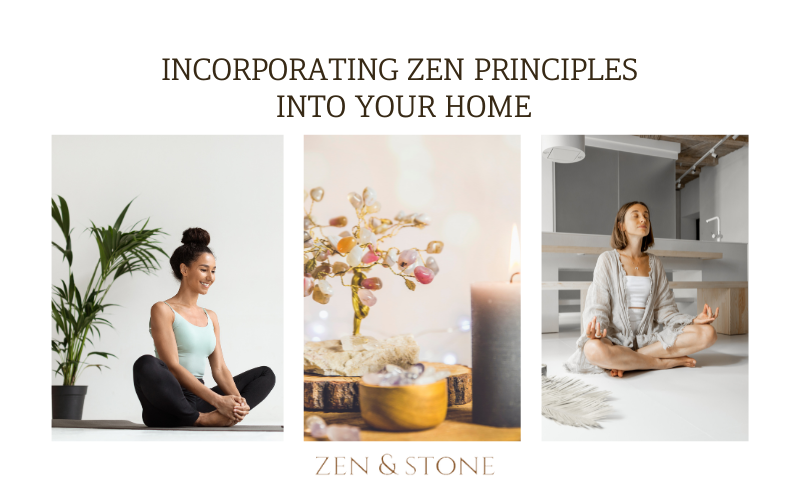
29 Sep Incorporating Zen Principles in Your Home
Bringing Zen principles into your home can help create a peaceful and calming environment. Zen design style originates from Zen Buddhism and is all about creating balance and relaxation within your living space. By incorporating these principles, you can transform your home into a stress-free and inspirational space.
One way to bring Zen principles into your home is through decluttering. A cluttered space can create chaos and stress, while a clean and organized space can promote calmness and relaxation. Another way is to incorporate natural elements such as plants, wood, and stone. These elements can help bring a sense of serenity and connection to nature into your home.
Lighting can also play a significant role in creating a Zen atmosphere. Soft lighting can create a calming ambience, and candles with relaxing scents such as lavender or jasmine can help reduce stress and anxiety. By incorporating these simple changes, you can create a Zen-inspired home that promotes relaxation and peace.
Understanding Zen Principles
Zen philosophy is a way of life that originated in China and later spread to Japan. It is based on the idea that enlightenment can be achieved through meditation and mindfulness. Zen principles can be applied to various aspects of life, including home decor, to create a calm and peaceful environment.
One of the key principles of Zen is simplicity. Zen philosophy emphasizes the importance of eliminating clutter and excess, both in the physical environment and in the mind. This means that when designing a Zen-inspired home, it is important to focus on simplicity and minimalism.
Another important principle of Zen is mindfulness. This means being fully present in the moment and aware of one’s surroundings. By practicing mindfulness, one can cultivate a sense of inner peace and tranquility. In the context of home decor, mindfulness can be incorporated by choosing decor elements that are calming and soothing to the senses.
Zen philosophy also emphasizes the importance of natural elements. This means incorporating elements of nature into the home, such as plants, rocks, and water features. By bringing natural elements into the home, one can create a sense of harmony and balance.
Creating a Zen Space

Creating a Zen space in your home is all about creating a peaceful, calming environment that helps you relax and unwind. Here are some tips to help you bring Zen principles into your home:
Choosing the Right Colors
One of the most important things to consider when creating a Zen space is the color scheme. Zen spaces are all about creating a calm and peaceful environment, so it’s important to choose colors that promote relaxation and tranquility.
Some of the best colors to use in a Zen space include neutral shades like beige, gray, and white, as well as soft pastels like pale blue, lavender, and pink. These colors are soothing and calming, and they help to create a sense of harmony and balance in the space.
Using Natural Materials
Another key element of creating a Zen space is using natural materials. Zen spaces are all about simplicity and minimalism, so it’s important to choose materials that feel natural and organic.
Some of the best materials to use in a Zen space include wood, bamboo, stone, and natural fibers like cotton and linen. These materials are earthy and grounding, and they help to create a sense of connection with the natural world.
When choosing furniture and decor for your Zen space, look for pieces that are simple and uncluttered. Avoid anything that feels ornate or fussy, and focus on pieces that have clean lines and a minimalist aesthetic.
By incorporating these principles into your home, you can create a Zen space that helps you feel more relaxed and at peace.
Incorporating Zen Elements
Incorporating Zen principles into your home can help create a peaceful and relaxing environment. Zen design is all about simplicity, balance, and harmony. Here are some ways to incorporate Zen elements into your home:
Water Elements
Water is an essential element in Zen design. It represents calmness and tranquility. Incorporating water elements in your home can help create a soothing atmosphere. Here are some ways to add water elements to your home:
- Install a small indoor fountain or a tabletop water feature
- Use a water wall or a water curtain as a room divider
- Add a fish tank or an aquarium to your living room or bedroom
Air Elements
Air is another important element in Zen design. It represents freedom and movement. Incorporating air elements in your home can help create a fresh and lively atmosphere. Here are some ways to add air elements to your home:
- Use natural ventilation by opening windows and doors
- Add plants and flowers to your living space to improve air quality
- Use essential oils or incense to create a refreshing aroma
Earth Elements
Earth is a grounding element in Zen design. It represents stability and strength. Incorporating earth elements in your home can help create a sense of balance and harmony. Here are some ways to add earth elements to your home:
- Use natural materials, such as wood, stone, and bamboo
- Add plants and flowers to your living space to connect with nature
- Use earthy colors, such as beige, brown, and green
Fire Elements
Fire is a transformative element in Zen design. It represents passion and energy. Incorporating fire elements in your home can help create a warm and inviting atmosphere. Here are some ways to add fire elements to your home:
- Use candles or a fireplace to create a cozy atmosphere
- Add warm colors, such as red, orange, and yellow
- Use natural light to create a bright and cheerful environment
By incorporating these Zen elements into your home, you can create a peaceful and harmonious environment that promotes relaxation and inner peace.
Practicing Zen Habits
Practicing Zen habits can be a great way to bring mindfulness, simplicity, and harmony into your home. Here are a few ways to incorporate Zen principles into your daily life.
Mindfulness
One of the key principles of Zen is mindfulness, or being present in the moment. Here are a few ways to cultivate mindfulness in your daily life:
- Practice meditation: Even just a few minutes of meditation each day can help you cultivate mindfulness and reduce stress.
- Pay attention to your breath: Whenever you feel stressed or overwhelmed, take a few deep breaths and focus on your breath as it moves in and out of your body.
- Slow down: Take your time when you’re doing everyday tasks like cooking, cleaning, or walking. Pay attention to what you’re doing and try to be fully present in the moment.
Simplicity
Another important aspect of Zen is simplicity. Here are a few ways to simplify your life and reduce clutter:
- Declutter your home: Go through your belongings and get rid of anything that you don’t need or use.
- Simplify your schedule: Try to cut back on commitments and focus on the things that are most important to you.
- Practice minimalism: Consider adopting a minimalist lifestyle, which focuses on owning less and living with intention.
Harmony
Finally, Zen emphasizes the importance of harmony and balance. Here are a few ways to cultivate harmony in your home:
- Create a peaceful environment: Use calming colors and natural materials in your home decor to create a peaceful atmosphere.
- Practice gratitude: Take time each day to reflect on the things you’re grateful for.
- Prioritize relationships: Focus on building strong, meaningful relationships with the people in your life.
By incorporating these Zen habits into your daily life, you can create a more peaceful, mindful, and harmonious home environment.

Maintaining Your Zen Home
Creating a Zen home is one thing, but maintaining it is another. The following tips can help you preserve the peaceful atmosphere you’ve worked hard to create.
Declutter Regularly
One of the most important principles of Zen is simplicity. To maintain a Zen home, it’s crucial to keep the space free of clutter. Regularly decluttering and getting rid of items that no longer serve a purpose can help you maintain a clean and organized space.
Keep a Neutral Color Palette
Neutral colors like beige, white, and gray are calming and can help create a peaceful atmosphere in your home. Stick to a neutral color palette for your walls, furniture, and decor to maintain a Zen-like ambiance.
Incorporate Natural Elements
Bringing elements of nature into your home, such as plants, rocks, and water features, can help create a sense of calm and tranquility. Consider adding natural elements to your decor to maintain a Zen-like atmosphere.
Practice Mindful Cleaning
Cleaning your home mindfully can be a meditative practice in itself. Instead of rushing through the cleaning process, take your time and focus on the task at hand. Pay attention to the sensations and movements of your body as you clean, and try to stay present in the moment.
Embrace Minimalism
Minimalism is an essential aspect of Zen philosophy. To maintain a Zen home, it’s important to embrace minimalism and avoid accumulating unnecessary possessions. Focus on quality over quantity, and only keep items that bring you joy and serve a purpose.
Conclusion
Finally, Zen philosophy emphasizes the importance of balance. This means creating a sense of balance and harmony between different elements in the home, such as light and dark, yin and yang, and so on. By creating a sense of balance and harmony, one can create a peaceful and calming environment in the home.

Sorry, the comment form is closed at this time.